 An Open Letter to University Presidents
An Open Letter to University Presidents
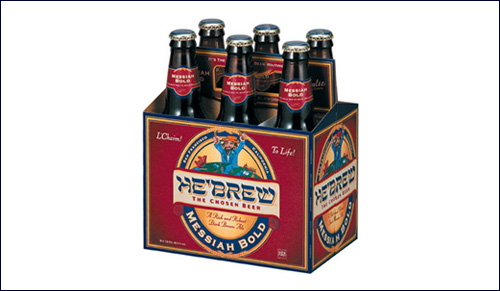

7 min read
For centuries Jews have been vital in the production and marketing of beer.
Here are 8 surprising facts about Jews and this history of this popular drink.
Beer-making dates to ancient times. Egyptian tombs depict pictures of beer brewing; Hammurabi’s Code, from 18th century BCE Mesopotamia, mentions beer; the ancient Greeks learned how to brew beer from Egyptians and brought this knowledge to Europe.
Ancient Israel, in contrast, favored wine over beer. But after the destruction of the ancient Temple in Jerusalem in 586 BCE, Jews were exiled to nearby Babylonia and adopted the Babylonian taste for beer. The Talmud records four different types of beer, brewed from barley, dates, figs and beer (Pesachim 107a). The modern usage of hops, a plant related to mulberries, in beer is also mentioned in the Talmud, which notes hops’ medicinal properties of being a preservative and antiseptic (Avodah Zarah 31b).
Beer’s popularity with ancient Jews is also evident in the fact that beer is an acceptable substitute for wine in the Havdalah ceremony, marking the transition from Shabbat to the rest of the week.
In the Middle Ages, Germany embraced beer. By law, Jews were barred from brewing the popular national drink. That didn’t change until the 1800s, but Jews became central to the beer industry in another way: by growing a flower called hops, which is a crucial ingredient in beer.
By the time the Nazis rose to power in the 1930s, Jews controlled about 70% of German’s important hops industry.
Germany’s 1516 “beer purity law” mandated that beer be made only with hops, barley, yeast and water. Hops were suddenly in great demand, creating a key business opportunity. At the time, many Jews were being expelled from German cities. Resettling in the countryside, Jews began to grow and trade hops, soon dominating the industry. By the time the Nazis rose to power in the 1930s, Jews controlled about 70% of German’s important hops industry.
Ironically, the purity of German beer was noted with a mark that looked decidedly Jewish; a six-pointed star, much like (though not related to) the Jewish Star of David.
A 1764 census of Polish Jews found that approximately 80% of Jews living in villages worked in the alcohol trade, distilling and selling wine, vodka, liqueurs and beer. Poland’s vodka and beer industries grew in the 1500s, as landowners devoted more land to grow the grains needed for these drinks and set up taverns to sell them in. Many of the innkeepers who ran these taverns were Jews who were seen as more sober and responsible than the general population.
So ubiquitous were these Jewish managers that the image of a kindly Jewish innkeeper became ingrained in Polish life. One example is the character of Jankiel the tavern-keeper, a wise and patriotic Jew created by Poland’s national poet Adam Mickiewicz in his work “Pan Tadeusz”.
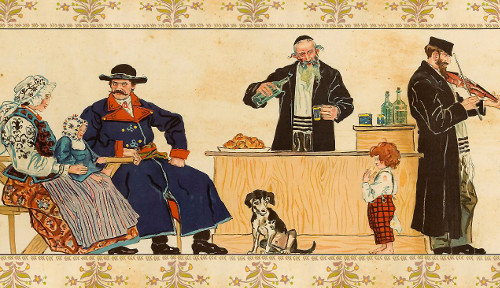
In the 1800s, Jews found themselves gradually edged out of the beer and liquor trade in Poland by a series of anti-Semitic laws, though even then, many Christian tavern owners would continue to clandestinely employ Jewish managers, who had so shaped Poland’s beer and tavern culture through the ages.
Ale in Colonial America was a popular drink, often brewed at home for family consumption. At a time when water supplies were often contaminated, beer provided a relatively safe alternative to drink. Unlike modern beers, some of these beers were less alcoholic, making them more suitable to drink regularly.
It seems that Jews in Colonial times partook of beer, as well. In his 2004 book “The Jews in Colonial America”, author Oscar Reiss provides the example of the household of Judah Hay, a middle class Jew in New York City, who once lived with his family in a home rented from Founding Father John Jay. The family recorded monthly spending 1.3 British pounds on three barrels of beer, more than enough to drink ale every day if they wished.
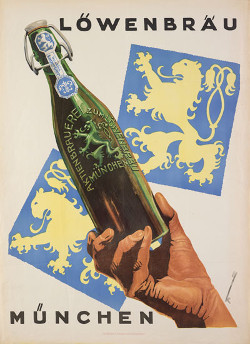 In Germany, Jews were finally allowed to make and sell beer in 1868, and they quickly revolutionized the industry, improving beer production in Germany and beyond. Bernhard Purin, director of Munich’s Jewish Museum who recently staged an exhibit on “Jewish Brewery Tales”, notes that “Jews in Germany were always very successful in times of modernization, and so they came into the brewing business when there was a need for modernization”.
In Germany, Jews were finally allowed to make and sell beer in 1868, and they quickly revolutionized the industry, improving beer production in Germany and beyond. Bernhard Purin, director of Munich’s Jewish Museum who recently staged an exhibit on “Jewish Brewery Tales”, notes that “Jews in Germany were always very successful in times of modernization, and so they came into the brewing business when there was a need for modernization”.
Jewish brewers introduced modern manufacturing methods for beer. One of the pioneers was Jakob von Hirsch, a Jewish baron, who envisioned a modern beer factory near Munich. Blocked for years by locals who resented his plans, Baron Hirsch eventually opened Planegg Castle Brewery in 1836, becoming Germany’s very first industrial-scale beer brewer.
Lowenbrau, one of Germany’s best known beer brands, was also shaped by the vision of its Jewish chairman, Moritz Guggenheimer, who was one of the first to realize the potential of moving freight by rail, and turned what had previously been a small local brewery into Munich’s largest beer exporter. By World War II, after merging with another Jewish-owned beer company, it was Germany’s largest brewer. (Under the Nazis, the company was turned over to non-Jewish owners and its last Jewish chairman was sent to a concentration camp.)
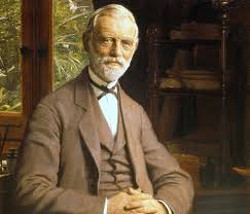 JC Jacobson
JC Jacobson
German Jews helped spread their newfound brewing knowledge outside of Germany. A Jewish amateur brewer named JC Jacobson travelled to Munich in the 1840s to learn about cutting edge brewing technology. When he returned to his native Denmark, he founded Carlsberg Beer, still Denmark’s largest and best known beer brand.
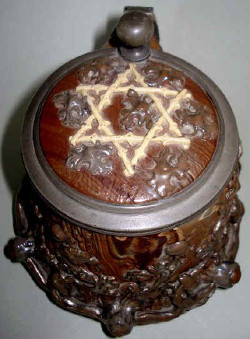 Germany’s iconic decorated beer steins, surprisingly, are a Jewish invention. Germans traditionally drank their beer from plain, unadorned steins. Starting in the 1800s, Jewish entrepreneurs began making ornate, decorative steins. The trend caught on, and today beautiful beer steins are a quintessentially German art form.
Germany’s iconic decorated beer steins, surprisingly, are a Jewish invention. Germans traditionally drank their beer from plain, unadorned steins. Starting in the 1800s, Jewish entrepreneurs began making ornate, decorative steins. The trend caught on, and today beautiful beer steins are a quintessentially German art form.
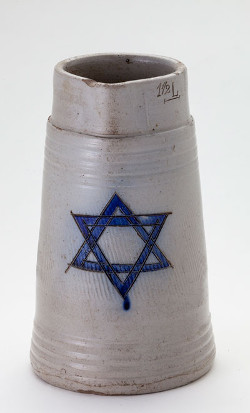 Bringing Beer to America
Bringing Beer to AmericaAs waves of German immigrants, including Jews, poured into America in the 19th Century, they brought their taste for beer and their know-how in producing top German-style brews with them. One of the best known beer labels founded by a German Jewish family was Rheingold Beer, started by a Jewish immigrant named Samuel Liebermann in Brooklyn in 1850.
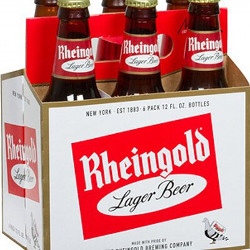 The current explosion of craft-beer brewing in America has included a high number of Jewish producers making boutique beers. Some have stressed their Jewish roots: the Schmaltz Brewery of New York produces beers called “Messiah”, “Manna” and “Jewbilation”.
The current explosion of craft-beer brewing in America has included a high number of Jewish producers making boutique beers. Some have stressed their Jewish roots: the Schmaltz Brewery of New York produces beers called “Messiah”, “Manna” and “Jewbilation”.
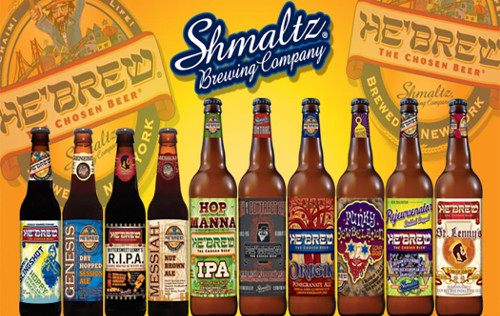
Israel might not have been known for beer in ancient times, but today the Jewish state boasts cutting-edge beer scene, with high quality microbreweries and annual beer festivals in Jerusalem and Tel Aviv.
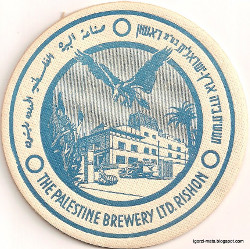 The first beer company in modern Israel was a French-Israeli venture known as Palestine Brewery Ltd, opened in 1934 in the Israeli town of Rishon Le Zion. The company produced a light lager and a root beer-like drink called Nesher Malt. In the 1950s, Rishon Le Zioin became home to another beer company, Cabeer Breweries, that invented Goldstar, a German-style pale lager. In 1968, Maccabee started producing a Czech-style lager that quickly became Israel’s best-selling beer.
The first beer company in modern Israel was a French-Israeli venture known as Palestine Brewery Ltd, opened in 1934 in the Israeli town of Rishon Le Zion. The company produced a light lager and a root beer-like drink called Nesher Malt. In the 1950s, Rishon Le Zioin became home to another beer company, Cabeer Breweries, that invented Goldstar, a German-style pale lager. In 1968, Maccabee started producing a Czech-style lager that quickly became Israel’s best-selling beer.
Israel’s first licensed microbrewery, Dancing Camel, made a startling discovery when it started producing beer in 2006: remains of a 5,000 year old brewery were discovered near the company’s modern Tel Aviv brewery. The company embraced Jewish history, even creating one beer made with date honey and made according to a 4th Century Jewish recipe, and dozens of other Israeli breweries followed suit.
Today, Israel is home to about 40 microbreweries. Israeli brewers have invented gluten-free beer, produced the world’s first date ale, and have created special beers that capture the flavors of the Jewish state, such as pomegranate-flavored beer made for Rosh Hashanah or beers flavored with etrogs. “We’ve won global awards for our beer” explains Israeli beer industry expert Avi Moskowitz.

Rheingold's founder was named Liebmann, not Liebermann.